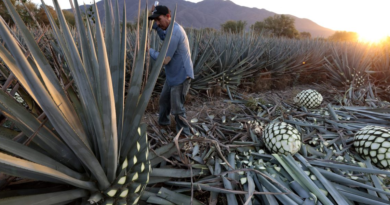Greenpeace activists are costing deep sea mining company $1 million daily by occupying its ship in the middle of the Pacific, lawsuit says
As Greenpeace activists continued to occupy a deep sea mining research ship in the Pacific Ocean, the mining company responsible for the expedition asked a Dutch court Tuesday to end the protest that it said was costing it $1 million a day.
The research expedition is being conducted by a subsidiary of The Metals Company (TMC), a Canadian-registered firm that next year plans to apply for the world’s first license to mine the deep sea for valuable minerals in international waters.
With opposition to mining biodiverse deep sea ecosystems growing, Greenpeace International dispatched its ship the Arctic Sunrise to intercept the TMC-chartered vessel, the MV Coco. On Saturday, Greenpeace activists boarded the Coco and climbed a winch used to lower equipment to the ocean. As of Tuesday, two activists were onboard the ship and Greenpeace said they would remain until TMC called off the expedition.
Greenpeace is registered in the Netherlands, and at a hearing in Amsterdam District Court on Tuesday, attorneys for TMC’s subsidiary asked a judge to order the activists to stand down and fine Greenpeace up €50,000 ($55,000) for each hour it does not comply. Scientists aboard the Coco have been gathering data on the impact of a test mining operation TMC conducted in 2022 at a site in the Pacific between Mexico and Hawaii. In its legal complaint, TMC said Greenpeace was deliberately obstructing its research and putting the activists’ safety at risk.
Attorneys for Greenpeace argued in its response that it was conducting a peaceful protest protected by the European Convention on Human Rights. They noted that the activists who boarded the Coco are “highly experienced climbers” and had trained for months for the mission.
“This is the importance of peaceful activism and bearing witness to an industry that has always operated in the shadows,” Greenpeace deep sea mining campaigner Louisa Casson said from the Arctic Sunrise.
A ruling is expected Thursday. “We have full faith in the Dutch courts to appropriately adjudicate on this matter, and feel confident after our day in court today,” a TMC spokesperson said in an email. TMC is among a handful of companies looking to extract polymetallic nodules — which contain minerals used in electric car batteries — from the deep sea.
Late Monday, International Seabed Authority (ISA) Secretary-General Michael Lodge sent a letter to Greenpeace Executive Director Mads Christensen calling on the activists to cease their occupation of the Coco. The ISA is the United Nations-affiliated organization that governs deep sea mining but has yet to adopt regulations permitting exploitation to proceed.
Lodge said he was acting under ISA regulations in response to a request from TMC “in the light of immediate and urgent threat of serious harm to the marine environment and the safety of life at sea.” Lodge also told Christensen that he was calling on the Dutch government to consider taking action against Greenpeace.
Casson said the ISA’s intervention showed that “the cozy ties between the so-called regulator and the industry are now abundantly clear.”




